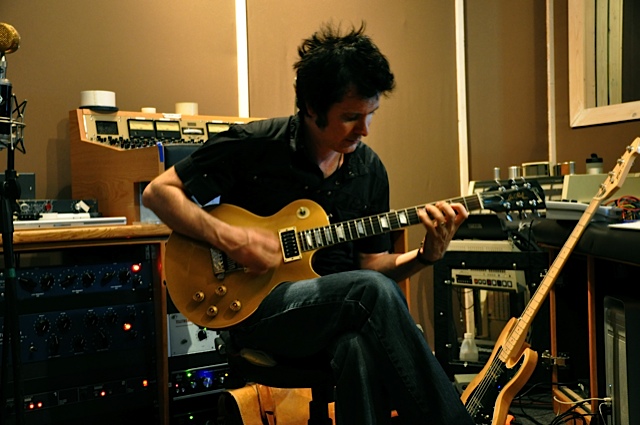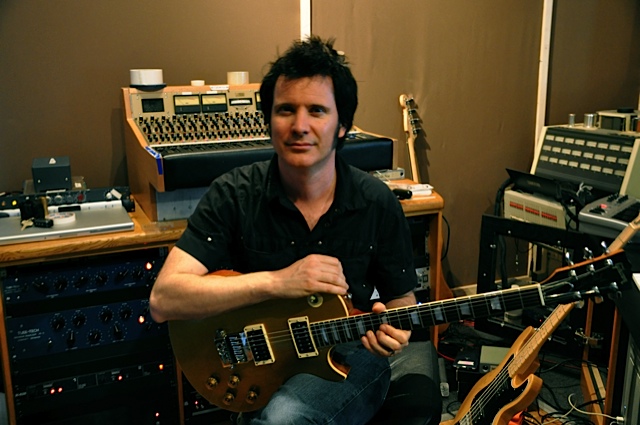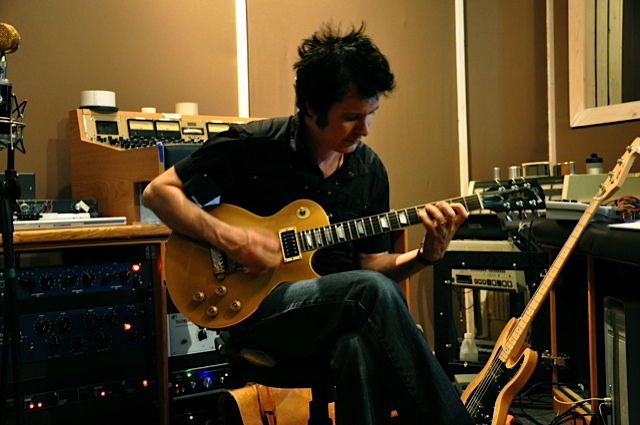Interview: Warren Huart On the Evolving Roles of Music Producers and Engineers

Warren Huart’s passion for music developed at a very early age, when his father introduced him to jazz and classical music.
Upon discovering rock and roll, he naturally gravitated to orchestral sounds and complex compositions; the works of ELO and Queen were influential for him as a listener, then a musician, and eventually in his work as a producer and engineer.
Huart’s ascent to the recording A-list included work as an independent artist, a studio musician — he still plays on some of the projects he records — and ultimately production, engineering, mixing and songwriting. His roster is diverse, including the Fray, James Blunt, Howie Day, Ben’s Brother and Aerosmith.
In this interview, Huart takes a look at the changing roles of producers and engineers, and talks about recording independent artists, including his work with singer/songwriter Jennifer Hope on her new album, Velvet Fire.
GUITAR WORLD: When did you develop an interest in being on the other side of the glass?
The terms producer and engineer — at that age, you may not understand the details, but you get the hierarchy. There’s the artist’s vision and there’s the producer and the engineer: Queen, Roy Thomas Baker and Mike Stone. I learned more about it as I got older. Now I understand that the engineer’s job on those records was of paramount importance. They were often the unsung heroes. Roy Thomas Baker and Jack Douglas were musicians turned engineers turned producers, and that’s my story as well. So Jack’s opinion is important not just because he’s my boss, but also because I respect him because he knows what he’s talking about and he’s done the jobs. He has experience.
Today, technology allows people to say that they do something for a living before they have the experience. My job is interpreting what the artist wants to say. I take what on the surface may seem like a crazy idea and make something that a large majority of people can relate to. That is the skill, and unfortunately, technology crept so rapidly in the last ten years. There are tools with which to do things, but a lot of things sound arbitrary because everybody uses the same ways to get from A to B.
All the latest guitar news, interviews, lessons, reviews, deals and more, direct to your inbox!
The job of the engineer is maligned because, “I can use a plug-in or software to have my drums in time.” Led Zeppelin had the greatest drummer in the world and he was not on a grid. He would swing and make a groove in a way that only he could do. Software now would make him so in time that I could play drums as an average drummer, time him and myself up and it would sound close, when in truth he had a groove that no other drummer had. That’s what made him who he was. That comes through experience. If you put software through a computer and your first production is timing drums perfectly, how will you learn time and feel? You won’t. Hence, they all sound the same In the 1970s and 1980s, you knew who was playing on records because drummers had a sound. Now it may as well be the same drummer on every record.
You work with new, established and independent artists. How do you select your talent?
I love working with independent artists. One of the really wonderful things that the Internet has done, more than anything else, is being able to get access to everyone. I get e-mails from independent artists all the time, and the technology is at such a level that if you are skilled enough, you can work at a significantly faster pace. I can track something, give it to the engineer, have him clean it up and I finish vocals on another song at my house.
Because things are quicker, it allows me time to work with independent artists. Their budgets are smaller, but I can work with that and I love it. A lot of the industry is very silver spoon and nepotism. When I grew up, there were five of us in a two-bedroom house and we had no money. My dad was an artist, a painter, so it was feast or famine, and anything I have, I got from working harder than my peers. I wasn’t gifted anything. So I identify with those independent artists because I was that artist.
My skill set is such that I can take what you do and make it compete with major artists. Because of the Internet, if you record great music and find fans via blogs and websites, you can build a fan base. You can find 200,000 people who like a genre of music, and if you get those fans, you can sell music and shirts and do online stuff. When I was a kid, if you were in a weird rock band, there was no way to get to fans of that music.
Seeing avenues open now for those artists makes it exciting. Then it’s taking them to the next step, and I want to do that. I produce, and I want to represent them in the world of film and television to make money and get them out there. I’ve seen predatory people come along, take these artists’ music, put it in catalogs and give them no money. I want to help these artists grow.
Your most recent independent project is Jennifer Hope’s new album, Velvet Fire. What made you want to work with Jennifer?
I’m a fan of her albums, she writes charts, and her arrangements are unbelievably complex. I had one keyboard player, a well-known session player, and it bewildered him and led me to change keyboard players! Jennifer submitted her music to me. I was working with a website and I got hundred of submissions. I listened to everything. I was doing the Aerosmith album, which we worked on for nine months over the course of a year. The first three months were spent in Boston at the studio that Jack had designed for them, and it was a great experience.
At night, I would go back to the two-bedroom apartment that Jack and I shared and listen to submissions from hundreds of artists. I’ve since been told by the website that I’m the only person who has done that. They don’t want to work with producers anymore because they all look at pictures and decide what money they could make, then send letters of rejection. On submission sites, producers listen to what is. They want to spin what’s there and take ownership of it.
My job is how I can be of service to this artist and move them to the next level, not take all the glory for the least amount of work. When people send me music, it’s because they chose me. If it’s not something I’d do, I still send them some encouraging words. I’d be up until 2 or 3 every morning, listening to submissions. There’s a lot of good music out there; 85 percent of it was good. The other 15 percent was either not good or potential great. Jennifer fell into potentially great.
Jennifer was closer along than some artists and I thought I could do so much more to make her music more accessible. I didn’t do major stuff. There were no rewrites. It was all about presenting it in a different way. I played most of the guitars, bass and keyboards on a few songs, programmed some stuff, and did the string arrangements.
For want of a better phrase, I wanted to make it more pop, meaning accessible, but keep the slightly darker, edgier sound so that she wouldn’t lose her fan base from Cleopatra Records. She definitely had a story to tell and I didn’t want to turn it into something completely different. If I use an external mixer, when they do a good job I find myself saying, “He made it more of what it is.” That is a good metaphor for an artist with a developed sound. We weren’t trying to reinvent the wheel with Jennifer. We just wanted to make the best version of what she could be and who she is.
Read more of Warren Huart’s interview here.
— Alison RichterAlison Richter interviews artists, producers, engineers and other music industry professionals for print and online publications. Read more of her interviews right here.


Alison Richter is a seasoned journalist who interviews musicians, producers, engineers, and other industry professionals, and covers mental health issues for GuitarWorld.com. Writing credits include a wide range of publications, including GuitarWorld.com, MusicRadar.com, Bass Player, TNAG Connoisseur, Reverb, Music Industry News, Acoustic, Drummer, Guitar.com, Gearphoria, She Shreds, Guitar Girl, and Collectible Guitar.
![B.B. King [left] cups his hands to his ear as he asks the crowd for more. Joe Bonamassa, with a Les Paul, gives his crowd a thumbs up](https://cdn.mos.cms.futurecdn.net/P3XrQLh86C27JfPp4AGp6n.jpg)